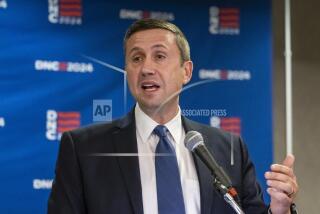Daschle Poised for New Power
- Share via
WASHINGTON — Soon-to-be Senate Majority Leader Tom Daschle (D-S.D.), spelling out some of the practical effects of the new political reality on Capitol Hill, said Sunday that Democrats will have one-person majorities in committees and that the Senate’s agenda will include Democratic priorities such as a patients’ rights bill.
Gone from the agenda, Daschle stressed, are some of President Bush’s priorities--such as a missile defense system that would violate the Antiballistic Missile Treaty, drilling in the Arctic National Wildlife Refuge and expanding nuclear energy.
While flexing the political muscle he gained with the decision of Sen. James M. Jeffords of Vermont to leave the Republican Party, Daschle made clear his intention to be more “inclusive” than Republicans in the Senate and White House have been.
But Republicans dug in their heels Sunday, suggesting that Daschle’s new hold on power is transient and declaring that their priorities will prevail.
“We’ll be able to get the president’s agenda put forward because it’s an agenda for America,” White House Chief of Staff Andrew H. Card Jr. said on CBS’ “Face the Nation.”
Outgoing Senate Majority Leader Trent Lott (R-Miss.) said on ABC’s “This Week” that Daschle may not find himself in the majority for long, and leadership of the Senate “may go back and forth another time or two in the next year and a half.”
But Democrats expressed skepticism that any in their caucus would flee.
“I don’t see that happening,” said Sen. Carl Levin of Michigan.
With the Sunday morning talk shows full of chatter about the new political reality, one guest was conspicuously absent: Jeffords. In a city where the most powerful senators and senior White House officials eagerly forfeit their Sundays to appear on the shows, Jeffords has never been a guest on “Meet the Press,” “Face the Nation” or “This Week,” according to the National Journal’s political hotline.
Daschle appeared on two shows: NBC’s “Meet the Press” and CNN’s “Evans, Novak, Hunt & Shields.” He made it clear that there had been a sea change in Washington.
Although Jeffords was the fourth in just a decade to change parties, he was the first senator in history whose swap altered the majority control of the Senate.
Even Card conceded that the effect would be “significant.”
Clearly, Democrats were looking forward to getting more respect. Daschle said that despite Bush’s talk about bipartisanship, the president had not spoken with Daschle for months before the Democratic leader called Bush last week.
Describing the reasons for the “on-again, off-again relationship,” Daschle said he supposed Bush did not feel he needed the Democratic majority and chose instead to work with a few conservative Democrats.
Sen. Charles Hagel (R-Neb.) said he hoped that the Jeffords experience will teach the president that he has to engage more deeply with senators.
“That means he’s going to have to understand issues better, more deeply, get himself immersed in this,” Hagel said.
He added that Jeffords’ defection reflected that the whole Republican Party--the president and himself included--had become “arrogant.”
The Senate is expected to reorganize upon returning from its Memorial Day recess in early June, and Daschle told CNN he doesn’t intend to use parliamentary techniques to stifle GOP views the way his counterpart blocked Democratic priorities when Republicans held a majority.
“We criticized that in the minority,” he said. “We’re not going to be criticized for it now that we’re in the majority.”
Despite the talk of cooperation and bipartisanship, Republicans and Democrats laid the groundwork Sunday for tough battles in coming months over energy, the environment and a measure to give patients greater rights in disputes with health care plans.
Daschle signaled that the so-called patients’ bill of rights was second on his list. (Education is first.) But Bush has vowed to veto the kind of measure that most Democrats support: one that would include a significant increase in liability for health plans and would put employers at risk of lawsuits in some cases.
Hot disputes are also likely in coming weeks over judicial and executive nominations and the mechanics of the Senate.
Lott said that the question of the ratio of Democrats to Republicans on committees remained open. But Daschle said that it had been decided in the discussions that the two party leaders held after the November election to set up a power-sharing agreement.
*
Times staff writer Aaron Zitner contributed to this story.
More to Read
Get the L.A. Times Politics newsletter
Deeply reported insights into legislation, politics and policy from Sacramento, Washington and beyond. In your inbox twice per week.
You may occasionally receive promotional content from the Los Angeles Times.









